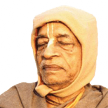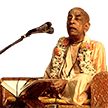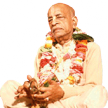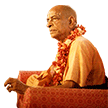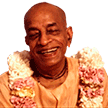Happiness and Distress - an essential subject: Difference between revisions
(Created page with "Category:Essential Subjects <!----------------------- edit below this line -----------------------> <!------------------------ begin introduction text --------------------...") |
(Vanibot #0041: Moves Choose Another box to the end) |
||
| Line 2: | Line 2: | ||
<!----------------------- edit below this line -----------------------> | <!----------------------- edit below this line -----------------------> | ||
<!------------------------ begin introduction text ------------------------> | <!------------------------ begin introduction text ------------------------> | ||
Sense perception is the cause of feeling all sorts of happiness and distress. Form, taste, odor, sound, and touch are different sense perceptions, which render happiness or distress in cooperation with the mind. Temporary sensations of happiness and distress, pertaining to the act of thinking, feeling, and willing under a false ego, are eternally different from the spirit soul and are therefore "unreal reality." | |||
Srila Prabhupada's books, lectures, conversations and letters offer a comprehensive presentation of this essential subject as seen in the '''[[Vaniquotes:Category:Happiness and Distress| | Srila Prabhupada's books, lectures, conversations and letters offer a comprehensive presentation of this essential subject as seen in the Vaniquotes '''[[Vaniquotes:Category:Happiness and Distress|Happiness and Distress]]''' category. An introduction from his books is given below in the following 12 quotes. | ||
<!-------- end introduction text and don't touch next three lines ---------> | <!-------- end introduction text and don't touch next three lines ---------> | ||
---- | ---- | ||
== Quotes from Srila Prabhupada's books == | == Quotes from Srila Prabhupada's books == | ||
<!----------------- edit quote boxes below this line -----------------> | <!----------------- edit quote boxes below this line -----------------> | ||
{{VaniQuotebox| | {{VaniQuotebox|Krsna is impartial, but because this is the material world of duality, such relative terms as happiness and distress, curses and favors, are created by the will of the Supreme|Kṛṣṇa is impartial, but because this is the material world of duality, such relative terms as happiness and distress, curses and favors, are created by the will of the Supreme. Those who are not nārāyaṇa-para, pure devotees, must be disturbed by this duality of the material world, whereas devotees who are simply attached to the service of the Lord are not at all disturbed by it. '''(Śrīmad-Bhāgavatam 6.17.29)'''}} | ||
{{VaniQuotebox| | {{VaniQuotebox|He by whom no one is put into difficulty and who is not disturbed by anyone, who is equipoised in happiness and distress, fear and anxiety, is very dear to Me|He by whom no one is put into difficulty and who is not disturbed by anyone, who is equipoised in happiness and distress, fear and anxiety, is very dear to Me. '''(Bhagavad-gītā 12.15)'''}} | ||
{{VaniQuotebox| | {{VaniQuotebox|Those who are free from false prestige, illusion and false association, who understand the eternal, who are done with material lust, who are freed from the dualities of happiness and distress, and who, unbewildered, know how to surrender unto the Lord|Those who are free from false prestige, illusion and false association, who understand the eternal, who are done with material lust, who are freed from the dualities of happiness and distress, and who, unbewildered, know how to surrender unto the Supreme Person attain to that eternal kingdom. '''(Bhagavad-gītā 15.5)'''}} | ||
{{VaniQuotebox| | {{VaniQuotebox|If one is fortunate enough to understand the happiness and distress of the spirit soul and gets a taste for transcendental knowledge, then he will be indifferent to the happiness and distress of the body and mind and will relish a transcendental peace|If one is fortunate enough to understand the happiness and distress of the spirit soul and gets a taste for transcendental knowledge, then he will be indifferent to the happiness and distress of the body and mind and will relish a transcendental peace eternal, even in the midst of worldly happiness and distress. Real peace can be obtained only in that transcendental stage of existence. '''(Message of Godhead, Chapter 1)'''}} | ||
{{VaniQuotebox| | {{VaniQuotebox|In all cases, one should be detached from the happiness and distress of family life, because in this world one can never be fully happy or fully miserable|In all cases, one should be detached from the happiness and distress of family life, because in this world one can never be fully happy or fully miserable. Happiness and distress are concomitant factors of material life. One should learn to tolerate, as advised in Bhagavad-gītā. One can never restrict the coming and going of happiness and distress, so one should be detached from the materialistic way of life and be automatically equipoised in both cases. '''(Bhagavad-gītā 13.8-12)'''}} | ||
{{VaniQuotebox| | {{VaniQuotebox|Happiness and distress do not hamper the process of devotional service. Therefore Srimad-Bhagavatam says that devotional service is ahaituky apratihata, unmotivated and uninterrupted|Happiness and distress do not hamper the process of devotional service. Therefore Srimad-Bhagavatam says that devotional service is ahaituky apratihata, unmotivated and uninterrupted. '''(Śrīmad-Bhāgavatam 6.16.34)'''}} | ||
{{VaniQuotebox| | {{VaniQuotebox|All thoughts of obtaining happiness by using the material senses have a false background and therefore have no meaning|The mental concoctions of happiness and distress in this material world are compared to dreams because of their falseness. All thoughts of obtaining happiness by using the material senses have a false background and therefore have no meaning. '''(Śrīmad-Bhāgavatam 7.2.48)'''}} | ||
{{VaniQuotebox| | {{VaniQuotebox|In this world, to distinguish between good and bad, happiness and distress, is meaningless because they are both mental concoctions (manodharma)|In the world of duality—that is to say, in the material world—so-called goodness and badness are both the same. Therefore, in this world, to distinguish between good and bad, happiness and distress, is meaningless because they are both mental concoctions (manodharma). Because everything here is miserable and troublesome, to create an artificial situation and pretend it to be full of happiness is simply illusion. '''(Śrīmad-Bhāgavatam 9.13.27)'''}} | ||
{{VaniQuotebox|Living entities have different kinds of bodies, in terms of the different aspects of nature, they are induced to act according to that nature. This is the cause of the varieties of happiness and distress|Living entities have different kinds of bodies, in terms of the different aspects of nature, they are induced to act according to that nature. This is the cause of the varieties of happiness and distress. '''(Bhagavad-gītā 14.5)'''}} | |||
{{VaniQuotebox|Learned men do give much stress to the happiness and distress of the soul proper, which is spirit and transcends the existence of the body and the mind. When we enter into such culture of knowledge, it is called transcendental knowledge|Learned men do give much stress to the happiness and distress of the soul proper, which is spirit and transcends the existence of the body and the mind. When we enter into such culture of knowledge, it is called transcendental knowledge. '''(Message of Godhead, Chapter 1)'''}} | |||
{{VaniQuotebox|Material distresses and happinesses are products of the three modes, and therefore the causes of such material distress and happiness have nothing to do with the transcendentalists|Material distresses and happinesses are products of the three modes, and therefore the causes of such material distress and happiness have nothing to do with the transcendentalists. '''(Śrīmad-Bhāgavatam 1.18.50)'''}} | |||
{{VaniQuotebox|Material happiness and distress come as soon as we accept a body, regardless of what form. We cannot avoid such happiness and distress under any circumstances. The best use of life, therefore, lies in reviving our relationship with the Supreme Lord, Visnu|Our only business in the human form of life should be to revive our relationship with the Supreme Personality of Godhead and thus become qualified to return home, back to Godhead. Material happiness and distress come as soon as we accept a material body, regardless of what form. We cannot avoid such happiness and distress under any circumstances. The best use of human life, therefore, lies in reviving our relationship with the Supreme Lord, Viṣṇu. '''(Śrīmad-Bhāgavatam 7.6.3)'''}} | |||
<!----------------- edit quote boxes above this line -----------------> | <!----------------- edit quote boxes above this line -----------------> | ||
| Line 31: | Line 39: | ||
'''Happiness and Distress - [[Vaniquotes:Category:Happiness and Distress|explore more within this category]]'''. | '''Happiness and Distress - [[Vaniquotes:Category:Happiness and Distress|explore more within this category]]'''. | ||
{{EsentialSubjectTotal}} | |||
<div style="float:left;"> | |||
{{EssentialSubjectnav}} | |||
</div> | |||
__NOTOC__ | __NOTOC__ | ||
__NOEDITSECTION__ | __NOEDITSECTION__ | ||
Latest revision as of 16:32, 22 November 2020
Sense perception is the cause of feeling all sorts of happiness and distress. Form, taste, odor, sound, and touch are different sense perceptions, which render happiness or distress in cooperation with the mind. Temporary sensations of happiness and distress, pertaining to the act of thinking, feeling, and willing under a false ego, are eternally different from the spirit soul and are therefore "unreal reality."
Srila Prabhupada's books, lectures, conversations and letters offer a comprehensive presentation of this essential subject as seen in the Vaniquotes Happiness and Distress category. An introduction from his books is given below in the following 12 quotes.
Quotes from Srila Prabhupada's books
Happiness and Distress - explore more within this category.
Vanipedia has now over 903 introductory articles compiled from Srila Prabhupada's books under the series titled Essential Subjects. All these articles can be seen in the Table of Content on the right side of this article and also here in this Umbrella Category. Browse through them to relish the breadth and depth of Srila Prabhupada's teachings - There is a subject for everyone.
